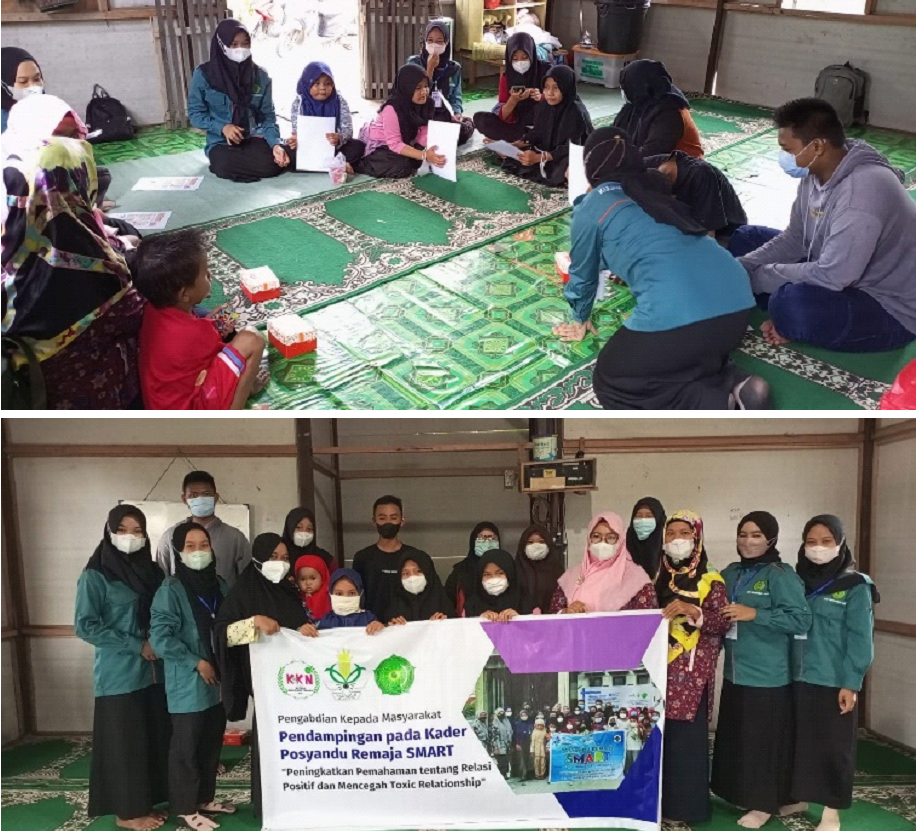Peningkatan Pemahaman tentang Relasi Positif dan Mencegah Toxic Relationship pada Kader Posyandu Remaja SMART Sampit, Kalimantan Tengah Increasing Understanding of Positive Relationships and Preventing Toxic Relationships among SMART Youth Posyandu Sampit, Central Kalimantan
Main Article Content
Abstract
Based on the results of a preliminary survey conducted with SMART Posyandu cadres using a Google form questionnaire, it was found that 100% of respondents stated that they had experienced negative relationships with friends, and 83% stated that they had experienced toxic relationships in friendships, so based on these results it is necessary to carry out counseling about understanding positive relationships and prevent toxic relationships. This activity aims to increase understanding of positive relationships and prevent toxic relationships—implementation of activities carried out through three stages: preliminary survey, planning, and implementation. The activity begins with giving a pretest and ends with giving a posttest to find out the level of understanding about positive relationships and preventing toxic relationships. The results obtained after counseling showed an increase in understanding; out of 22 participants, 11 people experienced an increase, seven got a fixed score, and only four got a decreased score. After counseling is carried out, the next step is to assist in strengthening the understanding of SMART Posyandu cadres in establishing positive relationships and preventing toxic relationships in friendships.
Downloads
Article Details

This work is licensed under a Creative Commons Attribution-ShareAlike 4.0 International License.
Authors who publish with this journal agree to the following terms:
- Any article on the copyright is retained by the author(s).
- Author grant the journal, right of first publication with the work simultaneously licensed under a Creative Commons Attribution License that allows others to share work with acknowledgment of the work authors and initial publications in this journal.
- Authors are able to enter into a separate, additional contractual arrangements for non-exclusive distribution of published articles of work (eg, post-institutional repository) or publish it in a book, with acknowledgment of its initial publication in this journal.
- Authors are permitted and encouraged to post their work online (e.g., in institutional repositories or on their websites) prior to and during the submission process, as can lead to productive exchanges, as well as earlier and greater citation of published work.
- The article and any associated published material is distributed under the Creative Commons Attribution-ShareAlike 4.0 International License
References
Amin, M., Wajdi, R., & Syukri. (2020). Perilaku Komunikasi Toxic Friendship (Studi terhadap Mahasiswa Fisip Universitas Muhammadiyah Makassar). Jurnal Komunikasi dan Organisasi J-KO, 2(2), 97–109. https://doi.org/10.26644/jko.v2i2.8074
Ardila, Y., Sutoyo, A., & Mulawarman. (2019). Keefektifan Kelompok Psikoedukasi dengan Teknik Modeling untuk Meningkatkan Keterampilan Sosial Siswa. Jurnal Edukasi: Jurnal Bimbingan Konseling, 5(1), 34–49. http://dx.doi.org/10.22373/je.v5i1.5926
Fitriani. (2020). Analisis Relasi Pertemanan Melalui Perilaku Asertif pada Mahasiswa Fakultas Ushuluddin Adab dan Dakwah IAIN Parepare. Skripsi. Parepare: Institut Agama Islam Negeri Parepare.
Lunanta, L. P., Kristiani, R., & Ardani, A. (2021). Psikoedukasi remaja: ketika pintar saja tidak cukup. Jurnal Pengabdian Masyarakat Ilmu Keguruan dan Pendidikan (JPM-IKP), 4(1), 30–35. https://doi.org/10.31326/jmp-ikp.v4i1.877
Prawintasari, E. (2022). Toxic Relationship Dalam Media Seni. Prosiding Seminar Nasional Bahasa, Sastra, dan Seni, 2, 228-237.
Qonitatin, N., Faturochman, F., Helm, A. F., & Kartowagiran, B. (2020). Relasi Remaja – Orang Tua dan Ketika Teknologi Masuk di Dalamnya. Buletin Psikologi, 28(1), 28-44. https://doi.org/10.22146/buletinpsikologi.44372
Rahmat, P. S. (2019). Perkembangan Peserta Didik. 2nd edition. Jakarta: Bumi Aksara.
Salsabila, S. M., & Maryatmi, A. S. (2019). Hubungan Kualitas Pertemanan dan Self Disclosure Dengan Subjective Well-Being Pada Remaja Putri. IKRA-ITH Humaniora, 3(3), 71–82.
Saputro, K. Z. (2018). Memahami Ciri dan Tugas Perkembangan Masa Remaja. Aplikasia: Jurnal Aplikasi Ilmu-Ilmu Agama, 17(1), 25-32. https://doi.org/10.14421/aplikasia.v17i1.1362
Sarwono, S. W. (2015). Psikologi Remaja. Jakarta: RajaGrafindo Persada.
